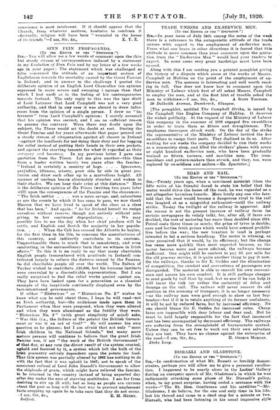SINN FEIN PROPAGANDA.
[To THY EDITOR or THE " SPECTATOR."] SIR,—You will allow me a few words of comment upon thathio but steady stream of correspondence induced by a statement in my Evolution of Sinn Fein and by my letter of a few weeks ago in your paper : The statement which was challenged as false concerned the attitude of an important section of Englishmen towards the mortality caused by the Great Famine in Ireland; and in answer to the challenge I quoted the
deliberate opinion of an English Lord Chancellor (an opinion expressed in- more severe and sweeping- 1: nguage than that which. I had used) as to the feeling of his contemporaries towards Ireland. The only reply to this was the• ipse dixit of Lord Latymer that Lord Campbell was not a very good authority, and that in any case it was absurd to draw infer- ences from the opinion of a single person. I drew no "in- ferences:" from Lord Campbell's opinion; I merely assumed that his opinion was correct, and I see no sufficient reason
to assume the contrary: Were there any doubt upon the subject, the Times would set the doubt at rest. During the Great Famine and for years afterwards that paper poured out a steady- stream of vituperation against all classes in Ireland —against the landlords for not doing their duty and for begging for relief instead' of putting their hands in their own pockets, and against the starving tenants for what it regarded as their savagery and baseness. In my previous letter I gave one quotation from the Times. Let me give another—this time from a leader written barely two years after the famine : "Ireland is certainly a country of bogs. . . . Ignorancei prejudice, idleness, misery, grow side by- side in great pro- fusion and- draw each other up to a marvellous height: All manner of unclean beasts alternately slumber and waken in their shades. We can hear their cries at this distance." Here is the deliberate opinion of the Times (written two years later still) upon the consequences of the Famine and the clearances : " The Irish cottier . . . was a mere savage, and, calamitous as are the events by which it has come to pass, we now thank Heaven that we have lived to speak of the class as a class that has been." And again : " As for Ireland herself we resign ourselves without reserve, though not entirely without mis- giving, to her continued depopulation. . . . We may possibly live to see the day when her chief produce will be cattle, and English and Scotch the majority in her popula- tion. . . . When the Celt has crossed the Atlantic ho begins, for the first time in his life, to consume the manufactures of this country, and indirectly contribute to its. customs. Unquestionably there is much that is consolatory, and even comforting, in the extraordinary turn.that we witness in Irish affairs." To this it is no reply to say that many charitable English people (remembered with gratitude in Ireland) con- tributed largely to relieve the distress- caused by the Famine. So did charitable people all over the world. The Sultan. of Turkey wished to contribute £10,000, but his humane instincts were overruled by a- discreditable- representation. But I am. really surprised to find the relief works quoted against me. They have been looked upon for a generation as a classical example of the ineptitude continually displayed even by the best-intentioned governments.
If either "Historicus " or " Historicus No. 2" wishes to
know what can be said about them, I hope he will read—not en Irish authority, but—the criticisms made upon them in Parliament when they were proposed, when they were altered and when they were abandoned as the futility they were. "Historicus No. 2'" (with great simplicity of mind) asks, " Was this (i.e., the failure of the potato) the British. Govern- ment or was it an act of God?" He will answer his own question as he pleases; but I am afraid that not only " most Irish children in the National Schools," but many more mature persons will continue to believe that the great Irish Famine was, if not " the work of the British Government" of that day, at any rate the direct result of the. system created, upheld and fostered by it, a. system which left the bulk of the Irish peasantry entirely dependent upon the potato- for food. That this system was partially altered by 1903 has nothing to do with the fact that it was upheld in 1841; not to speak of the consistent refusal of Lord John Russell's Government to allow the shiploads of grain, which might have relieved the famine, to be retained in the country instead of being exported day after day under the eyes of starving multitudes. I am far from desiring to stir up ill will; but so long as people are curious- about the past so long will the best way to prevent unpleasant facts cropping up again be to take care that they do not occur.
Belfast.


































 Previous page
Previous page